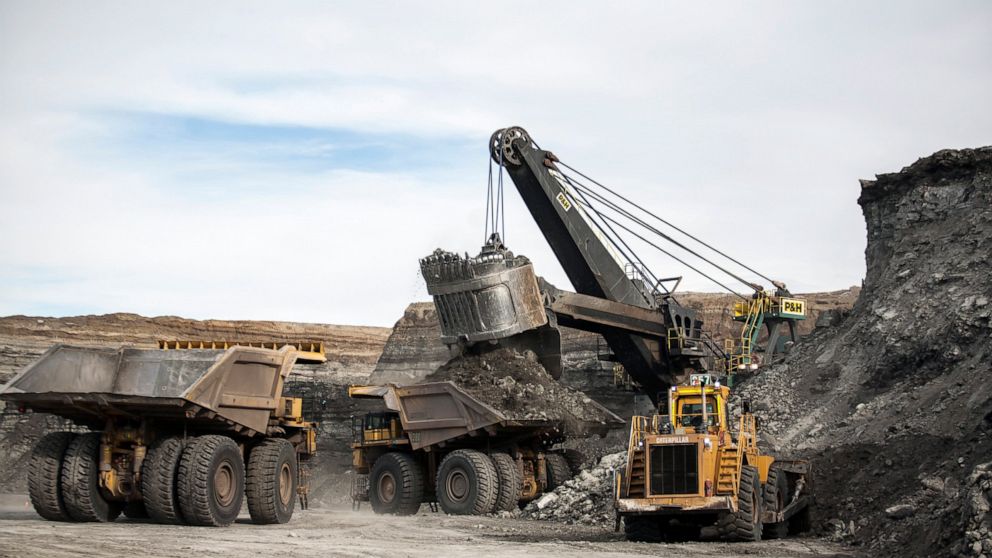Judge nixes bid to stop coal sales that Trump revived
A judge has dismissed a lawsuit from a coalition of states, environmental groups and American Indians that sought to revive an Obama-era moratorium against U.S. government coal sales on public lands in the West
By
MATTHEW BROWN Associated Press
May 23, 2020, 12:03 AM
4 min read
4 min read
BILLINGS, Mont. — A judge threw out a lawsuit on Friday from a coalition of states, environmental groups and American Indians which sought to revive an Obama-era moratorium against U.S. government coal sales on public lands in the West.
U.S. District Judge Brian Morris said President Donald Trump‘s administration had fixed its initial failure to consider the consequences for climate change from ending the moratorium. Acting under an earlier order in the case, the administration in February released an analysis that said the decision to resume coal sales would make little difference over time in greenhouse gas emissions from burning coal, a contention critics said was flawed.
Attorneys for the plaintiffs argued the administration only considered emissions from a handful of leases and failed to capture the cumulative, long-term impact of the coal program.
But Morris declined to weigh in on the accuracy of the administration’s conclusions. He said the February analysis was enough to fulfill the administration’s immediate legal obligations. Any review of whether it was flawed would require a new lawsuit, he added.
“Plaintiffs remain free to file a complaint to challenge the sufficiency of the (environmental analysis) and the issuance of any individual coal leases,” the judge wrote in a 24-page opinion.
Trump pledged as a presidential candidate to end the moratorium — part of what he called the “war on coal” — and in office has eased regulations in an attempt to bolster the industry. That’s despite market forces that have sharply curtailed mining. Coal demand among utilities has been dropping for years because of competition from cheaper fuels and rising costs to control pollution from coal.
The coronavirus pandemic has accelerated the decline. Yet critics of the coal program note that some lease sales have continued and say the administration’s moves could open tens of thousands of acres of public lands to new mining.
Attorney Jenny Harbine, who represented the Northern Cheyenne tribe and several environmental groups in the case, said the ruling would not stop the shift under way by many utilities away from coal to renewables and other cleaner sources of electricity.
“The Trump administration’s desperate efforts to subsidize coal won’t save the industry, they will only cause more damage to water, air and climate as we move to better alternatives,” she said.
The coal program is overseen by the U.S. Interior Department’s Bureau of Land Management, which welcomed Friday’s ruling.
“We will continue to take actions that responsibly manage public lands to the benefit and enjoyment of all Americans,” the agency said in a statement provided by spokesman Jeff Krauss.
The mining industry and two coal states, Wyoming and Montana, had intervened in the case on the side of the federal government. They said lawsuit inappropriately sought to use the court system as a “backdoor vehicle” to stop coal leasing after other branches of the federal government declined to take up their cause.
Montana Attorney General Tim Fox said the continuation of the leasing program was crucial for existing mines in his state, which has some of the largest coal reserves in the world along its southeastern border with Wyoming. If those mines are to continue operating, they will need to keep expanding onto federal lands, he said.
“You can’t just pick up an entire mine and move it elsewhere,” Fox said. “If you have to go around a federal section it not only makes it impractical but uneconomical as well.”
Opponents of the leasing program included the Democratic attorneys general of California, New York, New Mexico and Washington state.
In an initial ruling in the case last year, Morris faulted the Interior Department for not considering potential damage to the environment when it lifted the moratorium. In response, Interior Department officials looked at the potential effects from a small number of leases sold under Trump and concluded they would result in a negligible impact on climate change.
The leases in Utah and Oklahoma that were analyzed make up a small piece of a federal leasing program that accounts for about 40% of U.S. coal production, primarily from large strip mines in Western states.
National Mining Association spokesman Conor Bernstein said industry group was pleased the court accepted the government’s review as adequate, although it did not think it was necessary in the first place.
———
Follow Matthew Brown at @matthewbrownap
![]()


